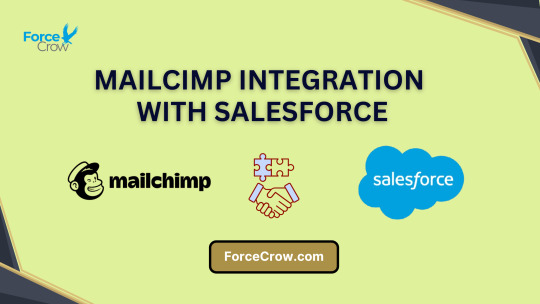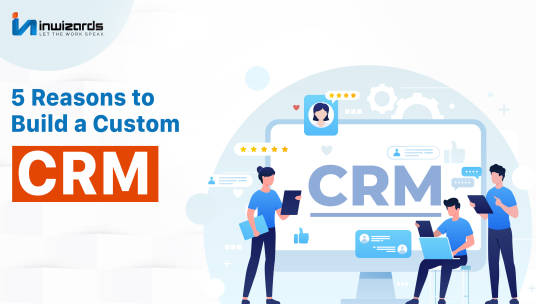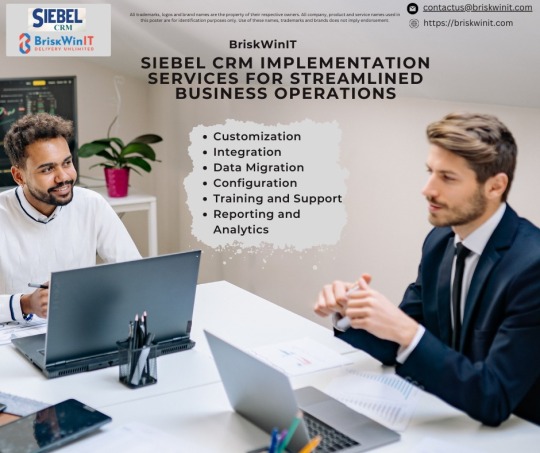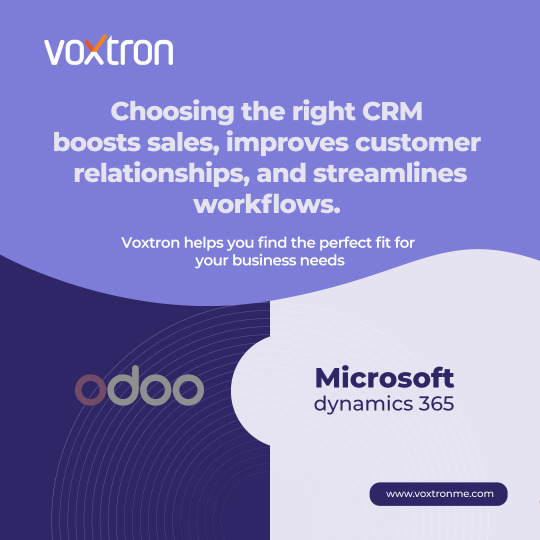#crmintegrations
Explore tagged Tumblr posts
Text

👉 7 CRM Integrations: The Ultimate Guide for Small Business Success! 💡
In today’s competitive market, customer relationships are the heart of every thriving small business. A robust CRM (Customer Relationship Management) system, paired with the right integrations, can take your business to the next level. 🚀
Please explore our YouTube channel for informative content. Link :- https://www.youtube.com/@sunshineitsolutions
Contact Us :- https://wa.me/+91-7230068888
0 notes
Text
Unlock Seamless Workflows with Expert HubSpot Integrations

In today’s fast-paced digital world, businesses rely on seamless processes and integrated systems to stay competitive. HubSpot integrations are essential for connecting your CRM with other tools, enabling unified workflows and optimized operations. At Sol Business, we specialize in delivering top-notch HubSpot integration services tailored to your business needs, helping you maximize the potential of your HubSpot CRM integrations.
As trusted HubSpot integration partners, we ensure that your systems work together flawlessly. Whether you need pre-built integrations or a custom solution, Sol Business is here to help you automate tasks, centralize data, and enhance productivity.
What Are HubSpot Integrations?
HubSpot integrations allow businesses to connect HubSpot’s CRM with other tools and software, such as eCommerce platforms, accounting software, marketing tools, and communication channels. This integration ensures:
Centralized Data: Eliminate data silos by keeping all customer and sales data in one place.
Enhanced Automation: Automate repetitive tasks like lead tracking, customer follow-ups, and billing processes.
Improved Collaboration: Align your sales, marketing, and customer service teams with seamless data flow.
Optimized Decision-Making: Get real-time insights through consolidated analytics.
Scalability: Easily scale your operations as your business grows.
At Sol Business, we ensure that these integrations align perfectly with your goals, enabling smarter workflows and more efficient processes.
Key HubSpot Integration Services by Sol Business
At Sol Business, we offer a variety of HubSpot integration services to suit businesses of all sizes and industries. Here are some of our most popular integrations:
1. HubSpot + Salesforce
Sync your HubSpot CRM with Salesforce to align sales and marketing teams. Seamlessly track leads, customer interactions, and performance across both platforms.
2. HubSpot + Shopify
Connect your HubSpot CRM with Shopify to enhance your eCommerce capabilities. Manage orders, automate abandoned cart emails, and nurture customer relationships with ease.
3. HubSpot + Slack
Integrate HubSpot with Slack to streamline internal communication. Get instant notifications for lead updates, task assignments, and critical milestones in real-time.
4. HubSpot + QuickBooks
Simplify financial management by integrating HubSpot with QuickBooks. Automate invoicing, track payments, and sync sales data effortlessly.
5. Custom HubSpot Integrations
Need something specific? As experienced HubSpot integration partners, Sol Business develops custom API integrations to connect HubSpot with your unique tools and systems.
Why HubSpot Integrations Are Essential for Your Business?
HubSpot is a robust CRM solution, but its true power lies in its ability to connect with other platforms. By leveraging HubSpot CRM integrations, businesses can:
Save Time: Automate repetitive tasks and reduce manual data entry.
Enhance Customer Experiences: Create personalized campaigns and timely follow-ups with centralized customer insights.
Increase ROI: Improve operational efficiency to generate measurable results.
Boost Team Productivity: Keep all teams on the same page with integrated workflows.
With Sol Business’s expertise, you can turn disconnected tools into a well-oiled machine that drives business growth.
Why Choose Sol Business as Your HubSpot Integration Partner?
At Sol Business, we pride ourselves on delivering high-quality HubSpot integration services. Here’s why businesses choose us:
Expertise: We bring years of experience in providing seamless HubSpot integrations tailored to unique business needs.
Custom Solutions: From standard integrations to advanced custom APIs, we create solutions that align with your processes.
Efficiency: Our streamlined implementation ensures minimal downtime and maximum results.
Ongoing Support: We provide post-integration support to keep your systems optimized and running smoothly.
Proven Success: As trusted HubSpot integration partners, we have helped businesses across industries achieve operational excellence.
FAQs About HubSpot Integrations
Q1: What is the benefit of HubSpot integrations? HubSpot integrations connect your CRM with other tools, enabling automation, centralizing data, and improving business efficiency.
Q2: Can HubSpot integrate with my existing tools? Yes, HubSpot supports a wide range of integrations, including Salesforce, Shopify, Slack, QuickBooks, and custom APIs.
Q3: How can Sol Business help with HubSpot integrations? Sol Business provides tailored HubSpot integration services, including custom API development and ongoing support.
Q4: How long does a HubSpot integration take? The timeline varies depending on the complexity of the integration. Sol Business ensures a smooth and timely implementation.
Q5: Can I get ongoing support after integration? Absolutely! Sol Business provides continuous support to keep your systems optimized for long-term success.
Q6: Are custom integrations available? Yes, Sol Business specializes in custom HubSpot CRM integrations to meet unique business requirements.
Streamline Your Business with Sol Business HubSpot Integrations
Unlock the full power of your CRM with seamless HubSpot integrations from Sol Business. Whether you need to align your sales and marketing teams, automate workflows, or improve customer engagement, our expert HubSpot integration services ensure your tools work in perfect harmony.
As experienced HubSpot integration partners, we focus on delivering solutions that drive efficiency, growth, and measurable results. Ready to take your business to the next level? Visit Sol Business HubSpot Integrations to learn more and get started today!
0 notes
Text

Strengthen your contact center operations with advanced AI insights and effortless CRM connectivity through Voxvantage, our innovative cloud platform. Unlock new levels of efficiency and customer engagement. Book your consultation today to learn more!
https://voxvantage.com/contact/
. .
#Voxtron #Voxvantage #CloudContactCenter #CustomerEXperience #CustomerEngagement #contactcenter #CRM #CRMintegrations #ContactcenterAI #dubai #uae
#Voxtron#Voxvantage#CloudContactCenter#CustomerEXperience#CustomerEngagement#contactcenter#CRM#CRMintegrations#ContactcenterAI#dubai#uae
1 note
·
View note
Text
Integrating Third-Party Tools into Your CRM System: Best Practices
A modern CRM is rarely a standalone tool — it works best when integrated with your business's key platforms like email services, accounting software, marketing tools, and more. But improper integration can lead to data errors, system lags, and security risks.

Here are the best practices developers should follow when integrating third-party tools into CRM systems:
1. Define Clear Integration Objectives
Identify business goals for each integration (e.g., marketing automation, lead capture, billing sync)
Choose tools that align with your CRM’s data model and workflows
Avoid unnecessary integrations that create maintenance overhead
2. Use APIs Wherever Possible
Rely on RESTful or GraphQL APIs for secure, scalable communication
Avoid direct database-level integrations that break during updates
Choose platforms with well-documented and stable APIs
Custom CRM solutions can be built with flexible API gateways
3. Data Mapping and Standardization
Map data fields between systems to prevent mismatches
Use a unified format for customer records, tags, timestamps, and IDs
Normalize values like currencies, time zones, and languages
Maintain a consistent data schema across all tools
4. Authentication and Security
Use OAuth2.0 or token-based authentication for third-party access
Set role-based permissions for which apps access which CRM modules
Monitor access logs for unauthorized activity
Encrypt data during transfer and storage
5. Error Handling and Logging
Create retry logic for API failures and rate limits
Set up alert systems for integration breakdowns
Maintain detailed logs for debugging sync issues
Keep version control of integration scripts and middleware
6. Real-Time vs Batch Syncing
Use real-time sync for critical customer events (e.g., purchases, support tickets)
Use batch syncing for bulk data like marketing lists or invoices
Balance sync frequency to optimize server load
Choose integration frequency based on business impact
7. Scalability and Maintenance
Build integrations as microservices or middleware, not monolithic code
Use message queues (like Kafka or RabbitMQ) for heavy data flow
Design integrations that can evolve with CRM upgrades
Partner with CRM developers for long-term integration strategy
CRM integration experts can future-proof your ecosystem
#CRMIntegration#CRMBestPractices#APIIntegration#CustomCRM#TechStack#ThirdPartyTools#CRMDevelopment#DataSync#SecureIntegration#WorkflowAutomation
2 notes
·
View notes
Text
With Unified Communication Services, get seamless #integration across channels: 🔹 Cross-channel integration for smooth #communication. 🔹 Intelligent #callrouting for smarter service. 🔹 CRM integration for enhanced efficiency. 🔹 Advanced #analytics to optimize performance.
Ready to streamline your communication? Let’s simplify your workflow today: https://www.vitelglobal.com/ucaas
#UnifiedCommunication#CrossChannel#SmartRouting#CRMIntegration#AdvancedAnalytics#VitelGlobal#Efficiency#USA#UCaaS
5 notes
·
View notes
Text
𝐒𝐮𝐩𝐞𝐫𝐜𝐡𝐚𝐫𝐠𝐞 𝐘𝐨𝐮𝐫 𝐌𝐚𝐫𝐤𝐞𝐭𝐢𝐧𝐠 𝐰𝐢𝐭𝐡 𝐌𝐚𝐢𝐥𝐜𝐡𝐢𝐦𝐩 + 𝐒𝐚𝐥𝐞𝐬𝐟𝐨𝐫𝐜𝐞 𝐈𝐧𝐭𝐞𝐠𝐫𝐚𝐭𝐢𝐨𝐧!
Ready to take your marketing efforts to the next level? 🌟 With Mailchimp Integration with Salesforce, you can seamlessly sync your customer data, create personalized email campaigns, and drive higher engagement! 📈✨
💡 Improve your ROI with real-time data updates, boost customer targeting, and streamline your marketing strategy effortlessly! 🎯
Want to know how? 👉 𝐂𝐥𝐢𝐜𝐤 𝐨𝐧 𝐭𝐡𝐞 𝐜𝐨𝐦𝐦𝐞𝐧𝐭𝐬 𝐛𝐞𝐥𝐨𝐰 𝐟𝐨𝐫 𝐦𝐨𝐫𝐞 𝐢𝐧𝐟𝐨! 👇

#Salesforce#Mailchimp#EmailMarketing#CRMIntegration#MarketingAutomation#CustomerEngagement#DigitalMarketing#CRM
2 notes
·
View notes
Text
Streamlining Efficiency and Customer Satisfaction: Call Center Setup and Management Solutions
In today's fast-paced business landscape, establishing an effective call center is crucial for organizations aiming to provide exceptional customer service. A well-designed call center setup, supported by robust management solutions, can significantly enhance operational efficiency, improve customer satisfaction, and boost overall business success. This article delves into the key components of a successful call center setup and explores innovative management solutions that can optimize performance and ensure customer-centric operations.

1. Strategic Planning and Infrastructure:
A successful call center setup begins with meticulous strategic planning. Understanding the organization's objectives, target audience, and service requirements is essential for designing an efficient infrastructure. Considerations such as call volume projections, necessary hardware and software, telephony systems, and network infrastructure must be carefully assessed. Advanced technologies like cloud-based solutions can offer scalability, flexibility, and cost-effectiveness, allowing businesses to adapt to changing demands.
2. Workforce Management:
A well-managed workforce is the backbone of any call center. Efficiently scheduling agents, forecasting call volumes, and accurately estimating staffing needs are crucial for maintaining service levels and minimizing wait times. Workforce management solutions leverage sophisticated algorithms to optimize scheduling, taking into account historical data, employee skills, and service level agreements. These tools enable organizations to strike a balance between customer demand and agent availability, enhancing productivity and reducing costs.
3. Quality Monitoring and Training:
To ensure consistent service quality, call centers must invest in robust quality monitoring and training programs. Implementing call recording and evaluation systems enables supervisors to assess agent performance, identify areas for improvement, and deliver targeted coaching and training. Real-time monitoring tools provide immediate feedback, allowing supervisors to intervene and guide agents during customer interactions. Continuous training programs enhance agent knowledge, soft skills, and product expertise, ultimately leading to enhanced customer satisfaction.
4. Omnichannel Integration:
Modern call centers must embrace omnichannel communication to cater to customers' evolving preferences. Integrating multiple channels, such as voice, email, chat, social media, and self-service portals, enables seamless interactions across platforms. A unified agent desktop interface and intelligent routing systems direct inquiries to the most suitable agents, ensuring consistent service delivery regardless of the channel. Omnichannel integration improves customer convenience, reduces resolution times, and fosters a personalized and consistent customer experience.
5. Analytics and Performance Metrics:
Data-driven insights play a pivotal role in optimizing call center operations. Advanced analytics tools can track key performance metrics, such as average handling time, first call resolution, customer satisfaction scores, and agent productivity. Analyzing this data helps identify operational bottlenecks, gauge customer sentiment, and make informed decisions. Predictive analytics can even anticipate customer needs, allowing agents to proactively address concerns and improve overall service levels.
6. Continuous Improvement and Feedback Loops:
A culture of continuous improvement is vital for the long-term success of any call center. Regularly seeking feedback from customers and agents alike helps identify pain points and areas of improvement. Employee engagement programs, feedback mechanisms, and recognition initiatives create a positive work environment and motivate agents to deliver exceptional service. By fostering a feedback loop, call centers can adapt to changing customer expectations, refine processes, and innovate to stay ahead in a competitive market.
Conclusion:
Setting up and managing a call center involves a multifaceted approach that blends strategic planning, technology implementation, and effective management solutions. By prioritizing infrastructure, workforce management, quality monitoring, omnichannel integration, analytics, and continuous improvement, businesses can establish customer-centric call centers that drive operational efficiency and enhance customer satisfaction. Embracing innovative solutions and staying attuned to evolving industry trends will position organizations for success in an increasingly competitive business landscape.
Click here to check my service on Fiverr
Source:
#CallCenterSetup#CallCenterManagement#CustomerService#ContactCenter#CustomerExperience#Outsourcing#BusinessSolutions#CustomerSupport#ServiceManagement#InboundCallCenter#OutboundCallCenter#VirtualCallCenter#OmnichannelSupport#CRMIntegration#AgentTraining#EfficiencyImprovement#QualityAssurance#PerformanceMetrics#CostOptimization#TechnologyIntegration#WorkforceManagement#Analytics#ProcessImprovement#CustomerSatisfaction#ServiceLevelAgreement
8 notes
·
View notes
Text










Exploring Salesforce integration? Discover strategies upping efficiency by 25% and join the 60% of businesses integrating. Need expert guidance? GetOnCRM has your back!
#salesforce#crmintegration#salesforce integration#salesforce solutions#technology#salesforce partner#getoncrm
2 notes
·
View notes
Text
5 Reasons to Build a Custom CRM

A CRM system is an essential tool for businesses to manage customer interactions effectively. There are numerous CRM software options available in the market.
In this article, we’ll delve into five reasons why it’s wise to invest in building a custom CRM. Firstly, custom CRMs are tailored to meet specific business needs and workflows, leading to more efficient processes and increased productivity. Secondly, custom CRMs offer enhanced security measures and better data privacy protection. Thirdly, a custom CRM can integrate seamlessly with your existing systems, providing a unified view of customer data.
Finally, building a custom CRM can be more cost-effective in the long run, as businesses can avoid ongoing licensing fees and expensive customization costs associated with off-the-shelf software.
Unique Functionalities One of the primary benefits of creating a custom CRM system is the ability to add unique functionalities that are customized for your business. Pre-built CRM software may not provide the flexibility required to tailor your customer interactions and user experience. With a custom CRM, you can add personalized dashboards, customized reports, and workflows that match your business processes.
This can significantly improve productivity and efficiency, as well as provide a competitive advantage over businesses that use generic CRM solutions.
Integration with Another System Building a customized CRM system provides an opportunity to integrate it seamlessly with other essential business systems. Pre-packaged CRM solutions may not offer the required level of integration, which can lead to disconnected data silos and inefficient processes. A bespoke CRM solution can be designed to work in tandem with other critical systems, such as ERP, accounting, and marketing automation software.
This creates a unified view of customer data, streamlines operations, and eliminates manual data entry errors. Customized integrations also help automate repetitive tasks, freeing up valuable employee time.
Security Data One of the most significant advantages of creating a custom CRM system is the ability to implement robust security measures to protect customer data. Pre-built CRM software can have vulnerabilities that leave customer data at risk of external threats, which can compromise customer trust.
A custom-built CRM system allows businesses to design security protocols and data privacy policies that align with their specific needs. This includes implementing encryption, access control, and data backup and recovery measures.
Eases Scaling Process Creating a custom CRM solution can help businesses ease the scaling process as they grow. As a company expands, its customer management requirements become more intricate, and out-of-the-box CRM software may not be adequate to handle the increased workload.
With a customized CRM solution businesses can tailor their CRM system to meet their evolving needs, adding features, functionalities, and integrations as required without switching to a new CRM platform entirely.
What is CRM Application Development? CRM application development is the process of building a customized customer relationship management system for businesses. Such systems are designed to help businesses manage their customer interactions, optimize their sales and marketing processes, and improve customer retention rates. Although there are off-the-shelf CRM solutions available, a custom CRM application provides businesses with a bespoke solution that caters to their unique needs.
The development process for a custom CRM application typically involves several stages. Firstly, a comprehensive analysis is conducted to understand the specific challenges and opportunities that the CRM system needs to address. This includes an evaluation of the current processes, data structures, and integrations that are in place.
Next, the development team creates a customized solution that addresses the identified challenges and opportunities. This may involve the creation of new features, the integration of existing software and systems, and the implementation of tailored security and privacy measures.
The coding and testing phases follow the design phase, with the development team creating the software and testing it thoroughly to ensure that it meets the business’s requirements and functions correctly.
Conclusion Creating a customized CRM solution provides businesses with a wide range of benefits that cannot be found in off-the-shelf CRM software. A tailored CRM application offers unique features and functionalities that address a business’s specific needs, enhancing the effectiveness and efficiency of its sales and marketing processes.
Moreover, Custom CRM Applications can be seamlessly integrated with existing software and systems, streamlining operations and saving time and resources. Additionally, custom CRM systems offer advanced security features that protect customer data, reducing the risk of data breaches and ensuring compliance with data protection regulations.
#crm software#crm development#crm solutions#crm software development company#CRM Software Development Service#crm implementation#crmintegration#CRM#crm development company#web development company#web development services
3 notes
·
View notes
Text

Are you ready to take your business to the next level? Our Siebel CRM implementation services are designed to streamline your operations, optimize your customer interactions, and propel your organization towards unprecedented success.
#SiebelCRMExperts#CRMImplementationServices#CRMTransformation#StreamlineYourBusiness#EfficientCRMSystems#CustomerSuccessJourney#CRMStrategy#DigitalTransformation#CRMIntegration#CRMConsulting#MaximizeCustomerValue#AccelerateBusinessGrowth#CRMCustomization#CRMUpgrade
3 notes
·
View notes
Text
Integrating Salesforce? Watch out for these 7 common pitfalls and learn how to avoid them! Inadequate planning, data management challenges, poor user adoption, and more. Discover the best strategies to overcome these obstacles and achieve a seamless Salesforce integration with GetOnCRM expertise.
#salesforce integration#salesforce#crmintegration#crm solution#businessimpact#data integration#data management#salesforce partner#technology#getoncrm
3 notes
·
View notes
Text
🚀 Power Up Your Business with the Right CRM! At Qubit International, we help you choose and integrate CRM platforms that drive real growth. From smart automation to seamless integrations, we’ve got your digital marketing needs covered! 💼✨
✅ Smart Automation ✅ Custom Dashboards ✅ Lead Management ✅ Seamless Integrations
💡 Ready to scale your business? Let’s talk!
📞 485 352 862 📧 [email protected] 🌐 qubit-international.com

#CRMFeatures#DigitalMarketingExperts#QubitInternational#BusinessGrowth#LeadManagement#AutomationTools#CRMIntegration#MarketingSolutions#GrowWithQubit
0 notes
Text

Choosing the right CRM is crucial for a company's success.
At Voxtron, we understand that every business has unique needs, which is why we offer efficient CRM integrations based on your unique business needs.
We don't just push any CRM on a business, we help you find the perfect fit based on your specific requirements. Contact us for more details.
.
.
#CRM #BusinessSolutions #Voxtron #odoo #microsoftdynamics365 #CRMintegrations #OdooParnter #microsoftdynamics365partner #Voxtronme #Microsoft #Customerrelationship #BusinessSolutions
#CRM#BusinessSolutions#Voxtron#odoo#microsoftdynamics365#CRMintegrations#OdooParnter#microsoftdynamics365partner#Voxtronme#Microsoft#Customerrelationship
1 note
·
View note
Text
Role of AI and Automation in Modern CRM Software
Modern CRM systems are no longer just about storing contact information. Today, businesses expect their CRM to predict behavior, streamline communication, and drive efficiency — and that’s exactly what AI and automation bring to the table.

Here’s how AI and automation are transforming the CRM landscape:
1. Predictive Lead Scoring
Uses historical customer data to rank leads by conversion probability
Prioritizes outreach efforts based on buying signals
Reduces time spent on low-potential leads
Improves sales team performance and ROI
2. Smart Sales Forecasting
Analyzes trends, seasonality, and deal history to forecast revenue
Updates projections in real-time based on new data
Helps sales managers set realistic targets and resource plans
Supports dynamic pipeline adjustments
3. Automated Customer Support
AI-powered chatbots handle FAQs and common issues 24/7
Sentiment analysis flags negative interactions for human follow-up
Automated ticket routing ensures faster resolution
Reduces support workload and boosts satisfaction
4. Personalized Customer Journeys
Machine learning tailors emails, offers, and messages per user behavior
Automation triggers based on milestones or inactivity
Custom workflows guide users through onboarding, upgrades, or renewals
Improves customer engagement and retention
5. Data Cleanup and Enrichment
AI tools detect duplicate records and outdated info
Automatically update fields from verified external sources
Maintains a clean, high-quality CRM database
Supports better segmentation and targeting
6. Workflow Automation Across Departments
Automates repetitive tasks like task assignments, follow-ups, and alerts
Links CRM actions with ERP, HR, or ticketing systems
Keeps all teams aligned without manual intervention
Custom CRM solutions can integrate automation tailored to your exact process
7. Voice and Natural Language Processing (NLP)
Transcribes sales calls and highlights key insights
Enables voice-driven commands within CRM platforms
Extracts data from emails or chat for automatic entry
Enhances productivity for on-the-go users
#AICRM#AutomationInCRM#CRMSolutions#SmartCRM#CRMDevelopment#AIinBusiness#TechDrivenSales#CustomerSupportAutomation#CRMIntegration#DigitalCRM
2 notes
·
View notes
Text
Why TDZ Pro’s method works better than the old playbook. Timing. Sequence. Conversion.
1 note
·
View note
Text

#OdooCRM#SocialMediaIntegration#SmartMarketing#DigitalSalesTools#CustomerSuccess#MarketingAutomation#OdooExperts#GrowYourBusiness#BusinessTools#CRMSystem#OdooERP#BusinessAutomation#DigitalTransformation#TechForBusiness#ERPforSMB#OdooForGrowth#BusinessGrowth#WorkSmarter#BoostSales#TechMadeSimple#AllInOnePlatform#FromClickToCustomer#SmartMarketingSolutions#CRMIntegration#SocialCRM#CustomerEngagement#SmartSales#LeadManagement#SalesAutomation
0 notes